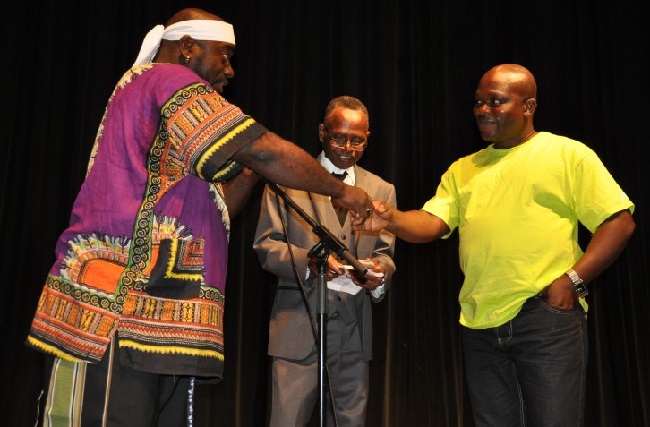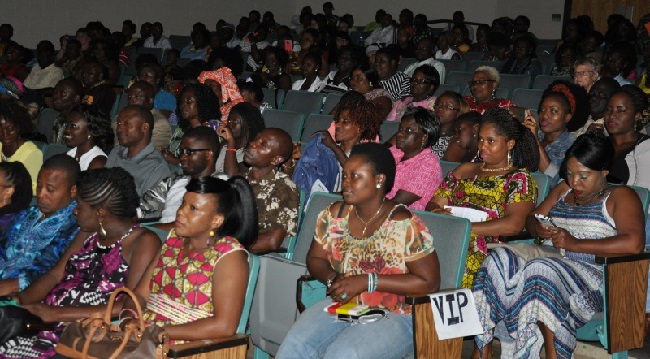Liberian artist group to sue government
Posted by admin on Sunday, September 6, 2015 · Leave a Comment

Francis Nimely Vinney Napla (l), Artistic Director, Liberian National Cultural Ambassadors, greets Andrew Tehmeh (r), Deputy culture minister. Jallah Koromah (c). Photo: Issa Mansaray/The AfricaPaper
Artists from the West African state of Liberia residing in the U.S., say they will soon begin legal process aimed to recover their country’s National Cultural Shrine – Kendeja sold to US billionaire eight years ago. Kendeja was sold to Robert L. Johnson, by Ellen Johnson-Sirleaf’s government in 2008; reports James Kokulo Fasuekoi.
Announcing the move at the Concordia Academy in Roseville, Minnesota. recently after a cultural festival, Francis Nimely Vinney Napla, Artistic Director for the Liberian National Cultural Ambassadors of America Inc, said his group will start the process by filing a petition against Johnson-Sirleaf’s government.
In case the recovery doesn’t materialize under the current government, Napla said, the LNCA intends to push the petition when a new administration takes over. At the same time he maintained, LNCA will continue its advocacy for the protection and preservation of Liberian cultural values.
His group, he noted, would plead with any incoming government of the country to find a more suitable site for the national ballet dance troupe to stay.
Napla’s announcement was greeted with wild applause from the audience of largely Liberians, Americans, as well as nationals from other African countries.
“We have no National Troupe right now; everything died. Everything [about culture] in Liberia is what you see on this stage right here,” said Napla, a sensational “Wula” dancer and onetime stage director for the National Cultural Troupe.
Wula, often referred to as “signed dance” is a unique male-dance of the Gola ethnic group of Liberia, and must be mastered by men graduating from the Poro (Polor) college. Napla, a Krao [Kru], joined the Polor in Behsao village, west of the capital when he was still a boy dancing for the Liberia National Cultural Troupe (LNCT). He later became director for “Tennego,” the junior national troupe of Liberia.
Kendeja is no more
“From 1960, people who were in Liberia know a place call Kendeja…where they had the Liberia national dance company. They [GOL] sold that place to a man from this country [United States] called Bob Johnson,” said Napla. His statement caused outrage and endless murmuring in the audience and it seems as though the sale of Kendeja had happened yesterday or that many were not yet aware.
Do you think the United States can sell a historical place (in the US) to an African to come an d build a hotel here?” he asked.
In response, spectators said “No” in unison, amid boos! “That is what happened to Liberia…they sold it [Kendeja] to Bob Johnson from BET and today our national historical place is transformed into a hotel resort. They [GOL] forgot about the arts,” lamented Napla.
The cultural center was not sold to Bob Johnson…its space was given up to Bob Johnson, and it [cultural center] was relocated to Ben’s [Boy’s] Town on Marshall Highway,” said Tehmeh.

Audience at the Ambassador’s performance. Photo: Issa Mansaray/The AfricaPaper
Tehmeh’s attempt to defend his government’s lack of cultural sensitivity, drew jeers from the hall with some demanding him to step down the stage, and allow the show to continue, rather than giving excuses for a government across the Atlantic Ocean.
Tehmeh was challenged for his vague claims. Others insisted that the Jallah Koromah, the Master of Ceremony, allows him to take few questions from the audience. In black jeans, with a lime-green T-shirt, the assistant cultural minister who had almost stepped off the stage returned to say, “I’m ready to take questions.”
His return further exacerbated the situation, thereby increasing the noise and heightening the booing so much so that the LNCA’s Napla had to rush on stage and intervened to avoid any confusion. The question time was disallowed.
In selling Kendeja, authorities had promised they would build a new cultural facility in Marshall, Margibi, in order to relocate members of the National Cultural Troupe. But, almost eight years after, neither the GOL nor its information bureau has responded to the situation.
As of the time of writing, the ballet dance group only existed in name; there is no National Troupe; no cultural center for rehearsals less alone a place to host members of the group. The pre-war number two national cultural village, Behsao, in Western Liberia has been long abandoned.
Due to current situation, evicted members of National Troupe have scattered around the country and forced to find alternative means to earn a living.
The Kendeja land agreement is designed for a 50 year period, meaning, the contract is expected to officially end in 2057. The controversial deal, yet to be made public through the media, states ‘Robert Johnson and Company’ will wire US $800,000 into the Liberian government’s coffers each year as of 2008 through the end of the agreement. The government is yet to explain to Liberians how the money is expended.
In early 2008, about hundred members of the LNCT along with their relatives were evicted from Kendeja, and rendered homeless by Sirleaf’s government in order to give clearance to the hotel’s construction after the agreement was sealed between Bob Johnson and the GOL.
The eviction exercise led to the dissolution of the entire National Cultural Troupe, considered as the nation’s pride for over 60 years. Reportedly, neither the government of Liberia nor its Ministry of Information Cultural Affairs and Tourism (MICAT) had put a mechanism in place for the upkeep of the group during the final deal.
A MICAT representative for the GOL reportedly offered US $1,000.00 to each member of the National Troupe in the form of “compensation” for relocation. It didn’t take long when the government evicted the artists, their children, along with relatives who lived there with them.
Members who received the one time “stipend” kept the news as a secret at first and didn’t inform their peers living abroad till government got ready to remove them. This infuriated their counterparts in the US and they accused remnants of the LNCT of alleged “conspiracy” with the GOL to sell out the national shrine. For a long period the incident brought serious conflict between both sides.



